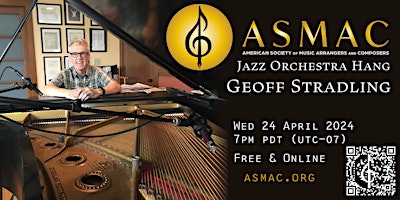Tribute to John E. Oliver
by Jeannie Gayle Pool
The August ASMAC luncheon was devoted to the role of sideliner musicians in film and television production. As part of the event I presented an historic photo collection of sideline musicians from the 1930s, 1940s, and 1950s to the AF of M, to Local 47 Archivist Gordon Carmadelle and officers of Local 47 including Leslie Lashinsky, Secretary/Treasurer and John Acosta (EMD Administrator). The photo collection was displayed at the event and a list of the musicians in the collection was distributed. [See the sidebar on the Sideliner Musicians Photo Collection.] I introduced Gordon Carmadelle who spoke about the Local 47 Archives that includes back issues of “The Overture,” reference books, contracts and other documents.
ASMAC Board member, composer and arranger Larry G. Goldman introduced the panel discussion by showing a rare video from the 1990s of John E. Oliver (1935-1996) speaking at University of Southern California about his career as a guitarist/vocalist and sideline contractor. During the video, Oliver talked about his work on the feature film “The Competition” starring Richard Dreyfuss. The large orchestra for that film worked for five weeks and Dreyfuss and Amy Irving were professionally coached to play well enough to appear on camera as pianists. Rumors abounded that the orchestral players could not play their instruments, so John asked the composer, Lalo Schifrin, to conduct the orchestra on the set to prove they could play together as an orchestra, which of course they did.
The discussion began with David Grossman, Executive Vice President of the National Association of Recording Arts & Sciences (NARAS) and formerly of Paramount Television Music, who started his music career as a drummer, composer, and music supervisor. Grossman remembered first meeting Oliver when, as a music supervisor at Columbia, Oliver helped him through the process of contracting and working with sideliners for a television show. Grossman said they enjoyed an immediate connection in the fact that they both came from Rochester, New York, and he described Oliver as “passionate, empathetic, understanding, and as a great mentor.” Grossman added that whenever he has an opportunity to mentor someone else in the business he does it in the spirit that Oliver mentored him some twenty years ago.
Grossman reminded the audience that at the studio, a sidelining call starts with the script requiring “on-camera musicians.” He said that at a meeting with the producers, he always had to explain the value of what live musicians bring to the product. Of course, the producers usually want to cut costs and want background actors to pretend to play musical instruments, but, Grossman pointed out that it is important “to talk them out of it” “I had many arguments about this and had to instill in them the importance of making the quality all that it could be while making sure that we conformed with union regulations,” he said.
Oliver’s sister, a jazz and r & b singer, Christine Day spoke next about her work as a contractor for sideliners with her partner/husband Bruce Atkinson, a bassist, vocalist, composer and music supervisor. After her brother’s death, she continued in the business with sideline contracting, production, and music supervision. Atkinson was part of the team that developed the online software, “Rapid Cue” used by some production companies today.
Day began her remarks by telling how she had just given a gig to someone in the audience at the luncheon, a female piano player, “Marina V.” whom she just met at the event. While eating her lunch, Day had received a call from a producer who needed a pianist. “So Marina has a job Friday,” Day announced, adding that nothing made her happier than to find work for people, particularly talented musicians.
Day said she is honored to be Johnny’s sister. “He really had a passion for music and for the people who worked for him. It was important for him, as it is for me, that the musicians are treated well. Johnny fought for them to be treated with respect.” He was well known and loved for his high level of professionalism and for his formidable musical talents and for protecting musicians from being recorded for the track without being paid for it
Day also made it clear that she and Atkinson do not hire people for sidelining who do not know how to play their instruments. She pointed out that once in awhile there is an opportunity for a sideliner to end up as the musician heard on the soundtrack and that it was just too risky to hire sideliners who fake it.
Day and Atkinson showed some video clips of some of their sideline contracting work. She spoke about one of greatest moments in the business, working on the television show “Boston Public” (Fox) which needed 35 young string players for a scene in an auditorium. They were playing from the original music charts for the scene, which is quite often the case. The actor conducting the group comes from a musical family. Christine asked the director if the kids could play the music on the break. “The kids were amazing and I was so disappointed that the kids couldn’t do the pre-record because they were 100% qualified to record it.”
Bruce Atkinson talked about how sidelining has changed from the days of John Oliver’s career, “now with laptops and full-on ProTools session.” Day discussed the fact they contract for both instrumental musicians and singers (AF of M, SAG, and AFTRA) and that, for example, for “Beverly Hills, 90210” they personally audition the singers, then choose the people they need. The recording session (called a “direct record”) and “on-camera” are paid separately. Basically, if someone moves their mouth on camera it involved SAG or AFTRA, although there are gray areas in the union rules. Atkinson noted that “SAG and AFTRA are more powerful unions than AFM, but we work as part of all three unions.”
Day and Atkinson generously passed out their business cards and invited attendees to send them their photos and resumes for consideration for sidelining.
Additional clips were shown of some of Day and Atkinson’s work, including a rock band music video clip from the feature film, “Daredevil,” (2003); as an example of work considered to be only sidelining. Christine had only four days to contract the orchestra. Bruce commented that he thought this scene represented a great triumph for Christine. He was conducting the session, but is not seen on camera. The large size of the orchestra matched the sound of the orchestra heard on the track which is one of the goals in quality sidelining work. Christine pointed out that most sidelining is “background,” but that she and Bruce have had some very “juicy moments.”
The next clip was from the television show “Providence” (NBC) that required four bands, each with unique arrangements and pre-record. This was also another last minute call and involved four different bands playing “Here Comes the Bride:” a steel drum version; a funk version; a DEVO-inspired synth version; and finally a hot all-girl big band. Christine pointed out that this clip is an example of what is known as “featured sideline,” which involves a higher pay scale, because the director is directing them.
The audience then watched a montage of sidelining work Day and Atkinson did for “Beverly Hills, 90210” and “Melrose Place” (Fox), involving famous performing artists which included sidelining band members miming to famous recordings. In one scene Christine Day sang on “Melrose Place” at the request of Aaron Spelling. Then there was a rather macabre clip from “CSI: Miami,” with the The Perri Sisters who actually sang and were recorded live on set as dead bodies fall out of a casket as it is being lowered into the grave.
Next there was a clip from the feature film “Playing by Heart” (1998) with sideliners playing the final wedding scene, featuring a trumpet solo sidelined and which was also pre-recorded by jazz trumpeter, Marcus Printup. The final clip was from “Dharma & Greg” (Fox), featuring a comedic opera singer, Alison England, in a dream sequence. This brilliant and hilarious performance was recorded live on the set.
Following some questions from the audience, Day concluded by saying, “We have a lot of fun working with many music supervisors and we are an asset for their team. When Johnny passed away, nothing was handed to us. We had to prove ourselves, and we did, and we continue proudly with Johnny’s legacy.”
Oliver’s praises were sung by people in the audience who had known him and worked for him, and his memory was very much honored by this event. Many thanks to Larry Goldman for creating a multimedia presentation to facilitate the smooth running of this informative and entertainment ASMAC event.
ASMAC Luncheons are held on the third Wednesday of every month and are open to the public.



